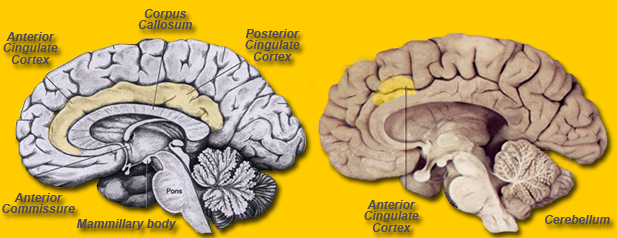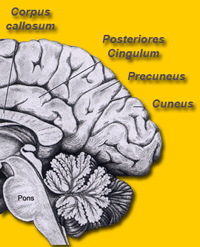
Source: "Neurology of Cognitive and Behavioral Disorders" (left) and "Mapping the Mind" (right), both edited |
|
Cingulate gyrus, Gyrus cinguliFunctionsDetection of errors, risk and conflict management, response inhibition, cognitive control, adaptation, Theory of Mind ToM (amongst others) Important part of the Limbic System Grief S; Pain, disgust (cognitive recognition - even by just observing scenes - and processing) S
|
Posterior Cingulate CortexFunctions(Episodic S) memory (caudal) S, Speech comprehension and production (due to declarative memory functions during communication) S (strong interactions with medial temporal cortex) S Theory of Mind ToM S Pain (rostral) S Disgust (cognitive recognition - even during mere observation of scenes - and processing) S Recognition of both personally familiar objects and places S, dPCC: Orientation in space, vPCC: Processing of information and objects that are relevant for the self; introspection S Disorders Early Alzheimer's Disease (retrosplenial/ posterior) S, Anxiety Disorders S, Alexithymia S, Schizophrenia S (verbal memory) S, Anorexia Nervosa S, Addiction (Cocaine) S; Autism S |
Anterior Cingulate CortexFunctionsReaction to committed errors S, 'Error detection', Error prediction (error likelihood and magnitude of the consequences) S Risk prediction, cognitive control, emotion regulation S, conflict monitoring, adjustments in behavior S, above all conflict detection between simultaneously active, competing representations S, minimization of distractions S Conflict -> acts as teaching signal for avoidance learning -> will bias behavioral decision making toward cognitively efficient tasks and strategies S Task and response conflict and anticipation S; the conflict signal detected by the ACC is transmitted to other brain regions, such as the DLPFC, to increase the level of cognitive control S Information transfer: to the auditory association cortices, brain stem vocalization, and autonomic structures, in pathways that may mediate emotional communication and autonomic activation in emotional arousal S Problem solving, concentration upon a task Response inhibition S, self-regulation, emotion regulation S Fear (rACC, gating the efficiency of amygdala-dependent auditory fear conditioning learning) S, S; pain S, S Dwelling on one's own thoughts and notions (inner life), motivation Important part of the reward system: anticipation of rewards, (reinforcement-related) decision making S, e.g. regarding how much effort to invest for rewards S, action evaluation, decision making regarding reward and punishment S, learning through consequences, avoidance learning S, behavioral adaptation after delivered punishments S |
Anterior Cingulate Cortex (functions continued)Craving (Nicotine) SEmpathy (with pain) S Theory of Mind ToM (bilateral) S Autonomic functions: modulation of blood pressure and heart rate amongst others * Dorsal=cognitive S, cognitive processing of stimuli, behavioral control S, attention, working memory, error detection, conflict monitoring S, response selection, anticipation of incoming information S, increasing attention to relevant stimuli S * Ventral=affective S, attention on the internal emotional and motivational status, regulation of autonomic responses S * Anterior=executive * Posterior=evaluative * Rostral: projection of positive future events, optimism S, detecting response conflict caused by irrelevant stimuli S Disorders Borderline PD S, S, PTSD S, S (rostral), Schizophrenia S, S, S, ADHD, Obsessive-Compulsive Disorder S, S, S, S, Autism S, Depression (BA 25, S, S, S, S), Anorexia Nervosa S, Bipolar Disorder S, S, Addiction (Cocaine, rostral) S, Addiction (Nicotine, Dopamine) S |
External Link Disclaimer: We as the creators of Brain-Maps.com are not responsible for the contents or reliability of any linked websites and do not necessarily endorse the views expressed within them. The listing of a link shall not be taken as endorsement of any kind. We cannot guarantee that these links will work all of the time and we have no control over the availability of linked pages.
Please note: While we as the creators of Brain-Maps.com make every effort to post the most accurate and reliable information, we do not guarantee or warrant that the information on this web site is complete, accurate or up-to-date. We assume no responsibility for the use or application of any posted material. This web site is intended solely for the purpose of electronically providing both the public and scientists with brain-related information and convenient access to the data resources. We assume no responsibility for any error, omissions or other discrepancies between the electronic and printed versions of documents.
We do not provide individual advice or counseling, whether medical, legal, or otherwise. If you are seeking specific advice or counseling, you should contact a licensed medical practitioner or professional. For comments, corrections or suggestions please send us an e-mail »
